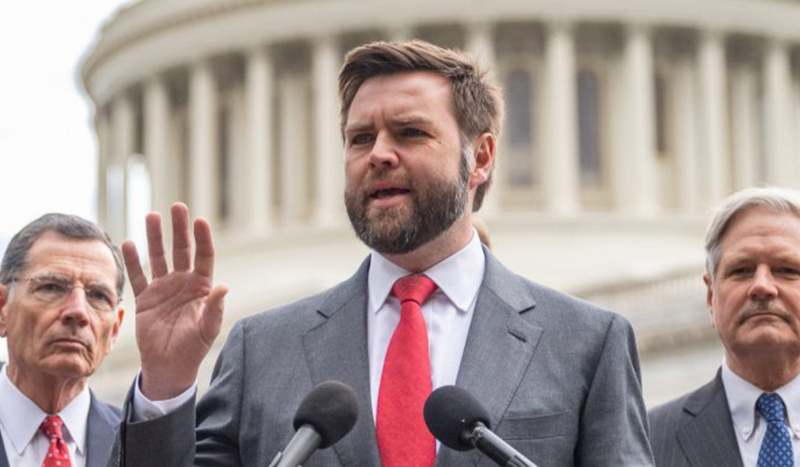
Wikimedia Commons
CV NEWS FEED // Vice President JD Vance spoke at the International Religious Freedom Summit Feb. 5 about how Church fathers shaped the concept of religious liberty as modern society knows it and about what the Trump administration’s vision for that liberty entails.
Religious freedom, Vance said in his address, “is the bedrock of civil society in the United States of America and across the world.” Faith helps cultivate healthy communities, he said, and “at home and abroad it fosters a love for one’s neighbors, it inspires generosity and service, it calls us to treat one another with dignity, to lift up those in need, and to build nations grounded in moral principle.”
Understanding the foundational importance of religious liberty, the Founding Fathers made it the first protected right in the Constitution, Vance noted. Their understandings of religious liberty came from the Christian Church fathers, whom Vance described as the US founders’ “own intellectual forebears.” He said that the Church fathers can be credited with “the very notion of religious liberty” that is known today, which includes free will and the inherent dignity of every person.
Principles outlining what religious liberty entails are also in the Gospel, Vance said, quoting Jesus’ words to “render unto Caesar that which is Caesar’s, and unto God that which is God’s.”
In the early Church, theologians and apologists had to respond to the religious persecution that occurred, Vance said.
“Early Christians of course suffered greatly,” he said, “and unfortunately many Christians still suffer today at the hands of oppressive state power.”
In response to the 3rd century Christian persecution, Tertullian of Carthage appealed to the Roman Consul for the freedom to practice one’s own religion, Vance said. The vice president noted that Tertullian is credited as the first person to use the phrase “religious liberty.”
Noting another Church father’s defense of such freedom, he said that the Emperor Constantine received advice from another Christian apologist about how “religion cannot be imposed by force,” Vance said, quoting the early Christian document the Divine Institutes.
John Adams, the first vice president of the US, referenced the Church Fathers in his personal writing, as did Thomas Jefferson, who owned a copy of Tertullian’s works, Vance said.
“This is the legacy that has guided America’s political principles from the founding to this very day,” Vance said.
Religious freedom is a protected right in the US. It is, however, not merely a matter of legality, Vance continued, but also of culture.
Religious liberty, he said, “is also about fostering a culture in which faith can thrive so that men and women can fully appreciate and respect the God-given rights of their fellow citizens. Because one of the wonderful apparent paradoxes of religion is that in connecting us to the sacred and to the universal, it deepens our commitment to the particular, to our neighbors, to our obligations to one another, to the individual communities that all of us call home.”
Vance later elaborated on the Trump administration’s approach to religious liberty. In the first administration, Trump focused especially on advancing religious freedom in foreign policy in China, Europe, Africa, and the Middle East, Vance said. Stateside, his administration also worked to combat anti-Semitism, protect conscience rights of physicians and faith-based ministries, and remove obstacles for religious organizations to contract with the government.
“You shouldn’t have to leave your faith at the door of your people’s government,” Vance said, “and under President Trump’s leadership, you won’t have to.”
He added that the Trump administration intends not only to restore what was achieved in the first term, but also to expand them. He noted actions Trump has taken since assuming office in mid-January to support religious freedom, such as pardoning pro-lifers who were imprisoned for their defense of the unborn.
The Trump administration holds that religious liberty needs to be defended not only as a legal matter, Vance said, “but as a lived reality, both within our own borders and especially outside.”
“In recent years, too often has our nation’s international engagement on religious liberty issues been corrupted and distorted to the point of absurdity. Think about this: how did America get to the point where we’re sending hundreds of thousands of taxpayer dollars abroad to NGOs that are dedicated to spreading atheism all over the globe?” Vance said. “That is not what leadership on protecting the rights of the faithful looks like, and it ends with this administration.”
It is crucial for the administration in its foreign policy to recognize when a regime does and does not uphold religious liberty, the vice president continued.
“The United States must be able to make that distinction,” Vance said. “We must be able to look at the catastrophes, like the plight of Iraq’s Christians over the past three decades, and possess the moral clarity to act when something has gone wrong.”
Vance said that there is much work to be done in the US and abroad to fully protect religious liberty for all persons and faith communities.
Concluding, he expressed gratitude to those present for their efforts on this front, saying: “Thank you most of all for believing, because we know that the source of religious liberty is the recognition that all of us are equal under the rights and laws of God, and that principle will guide us in the years to come.”

